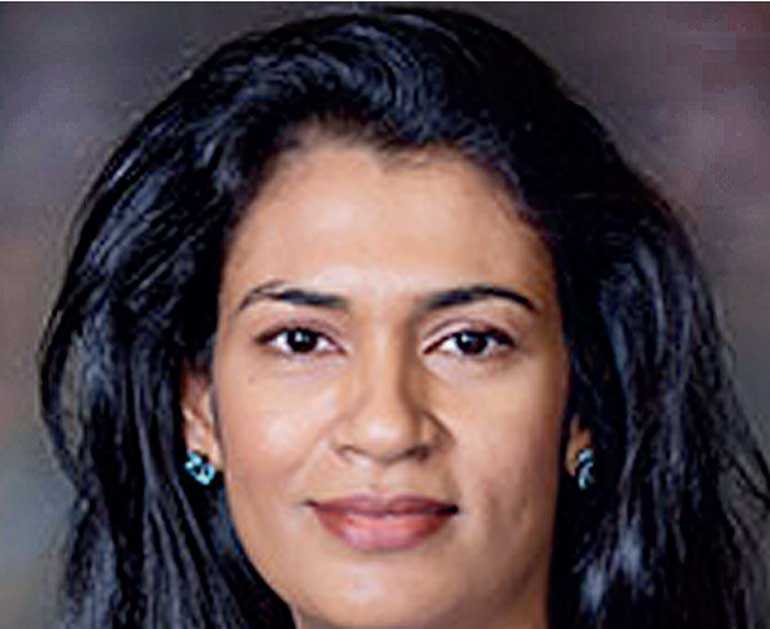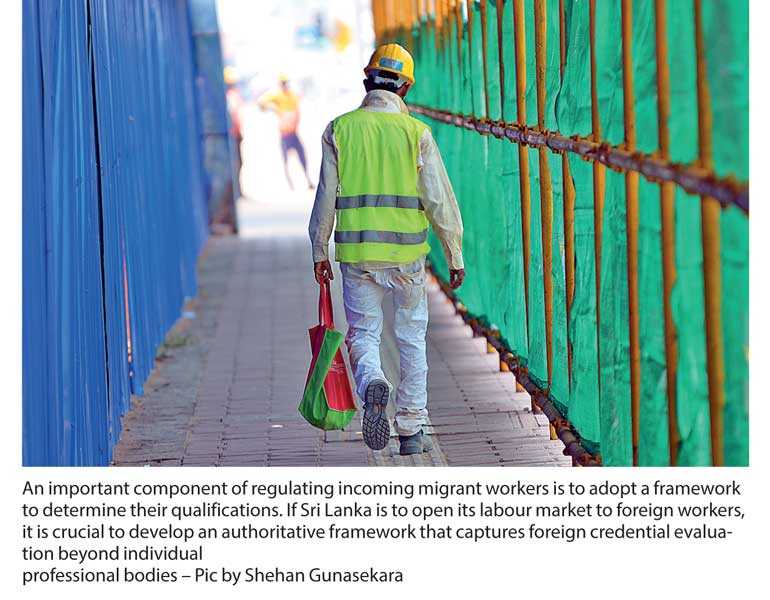Friday Feb 20, 2026
Friday Feb 20, 2026
Friday, 18 May 2018 00:00 - - {{hitsCtrl.values.hits}}

 By Bilesha Weeraratne
By Bilesha Weeraratne
With the recent signing of the Sri Lanka-Singapore Free Trade Agreement (SLSFTA), as well as the Economic and Technological Cooperation Agreement (ETCA) with India that is being negotiated, there has been wide public debate on the issue of allowing free movement of people across borders.
Historically, migration policy in Sri Lanka has focused exclusively on regulating the outflow of migrants. This is due in part to Sri Lanka’s status as a labour sending country. However, shifting dynamics hasten the need for stronger policies to increase Sri Lanka’s preparedness to receive incoming migrant workers.
The ability to retain skilled foreign workers, and continue to attract high-skilled migrant workers is contingent upon the development of policies that will cater to the needs of in-bound migrant workers while leveraging the potential they hold to foster economic growth and development in the country.
Managing the multi-dimensional challenges associated with migration, however, requires a set of comprehensive policies that are designed to maximise the benefits of migration, while minimising the potential harmful costs associated with the movement of people across international borders.
Current migration policy in Sri Lanka – the National Labour Migration Policy (NLMP) of 2008 – focuses on three main areas, namely: 1) governance of the migration process; 2) protection and empowerment of migrant workers and their families; and 3) linking migration and development processes. The policy identifies that return migration and circulation are key opportunities for skills transfer and productive employment.
Similarly, the NLMP of 2008 also notes that it would work to engage ‘transnational communities to harness the resources, skills and expertise of Sri Lankans working in skilled and professional capacities overseas by providing incentives to return, contributing to home country development’. However, these aspects on transnational communities have not yet gathered momentum in policy implementation.
At present, the NLMP explicitly excludes incoming migrants from its general purpose and scope. Hence Sri Lanka has no formal, regulatory framework to govern immigration of workers. As a result, Sri Lanka lacks domestic regulation to determine and recognise the foreign training, skills and education of incoming workers. The absence of an established protocol for training, skills and education recognition of incoming workers has been one of the central themes in the criticism levelled against the ETCA.
Professional bodies related mainly to the IT sector and medical field such as the Government Medical Officers Association (GMOA) have expressed fear that in an environment where qualifications of the professionals cannot be guaranteed, less qualified/skilled workers who fail to secure employment in India would seek employment opportunities in Sri Lanka.
Similarly, NLMP also leaves out any mention of students, be it incoming or outgoing. This reflects a significant loophole which must be addressed in order to ensure the protection of migrant students. Another area that the revised NLMP ought to focus is integration of immigrant workers, as integration policies are important to attract foreign workers into host-countries.
While immigration policies differ widely according to country-specific policy aims, there are several key lessons to be gleaned. Foremost, immigration policies designed to attract foreign workers must go hand-in-hand with national policy instruments designed to effectively integrate immigrants into host countries. Integration is considered to be the most effective way to realise the potential of migration.
The introduction of such policies recognises the responsibility of the host society to ensure the right of immigrants and newcomers to fully participate in the economic, social, cultural and political life of the country. For non-nationals, the existence of such policies also demonstrates the commitment of host-countries to protect and foster the wellbeing and development of migrant workers and their families.
In contrast to the NLMP, the National Migration Health Policy (2012) takes into account the needs of incoming migrants. However, it is severely limited in scope. Indeed, the policy sets out an imperative strategy to increase access to vital health services for all incoming migrants as well as to respond to potential health challenges arising from the movement of persons across borders, which marks an important step in the recognition of the rights of migrants workers and their families who live and work in Sri Lanka. However, the policy itself is inadequate as a stand-alone regulator as it only addresses a single, albeit important, aspect of immigration policy.
A protocol for evaluating credentials of incoming workers
An important component of regulating incoming migrant workers is to adopt a framework to determine their qualifications. If Sri Lanka is to open its labour market to foreign workers, it is crucial to develop an authoritative framework that captures foreign credential evaluation beyond individual professional bodies.
Such a framework would on the one hand ensure that foreign workers competing with Sri Lankan nationals are equally qualified. At the same time, employers in Sri Lanka will be able evaluate a pool of equally qualified talent – consisting of both local and foreign labour – to hire a worker who is best suited for the job. Most importantly, such a macro level authoritative competent authority would ensure an impartial evaluation of credentials, from a broader perspective which goes beyond the objectives of respective professional bodies.
Currently, in selected professions such as medical doctors and lawyers, there are regulatory mechanisms to recognise foreign qualifications of Sri Lankan nationals. For instance, the Examination for Registration to Practice Medicine in Sri Lanka (ERPM) – formerly known as Act 16 – is an overseas qualification recognition process carried out by the Sri Lanka Medical Council (SLMC) in conjunction with the University Grants Commission (UGC) of Sri Lanka. Sri Lankans with foreign medical qualifications who wish to practice medicine in Sri Lanka are required to pass the ERPM.
Similarly, the Law College of Sri Lanka conducts examinations to accept Sri Lankans with British qualifications to the legal profession in Sri Lanka. For instance, a Sri Lankan with a British Barrister qualification or an L.L.B. qualification can sit for the final examination of the Law College of Sri Lanka and enter the legal profession after completing the practical training and taking oaths.
Perhaps these existing mechanisms targeting Sri Lankan nationals with foreign qualification can serve as a foundation in developing a framework for qualification and credential recognition of incoming foreign workers with foreign qualifications.
As indicated in the above two examples, the existing mechanisms require foreign qualified professionals to sit local examinations prior to professional activities in Sri Lanka. By contrast, Mutual Recognition Agreements (MRAs), a key element of FTAs like ETCA, enable the qualifications of migrant workers recognised by a professional body in the sending country to be mutually recognised by its counterpart in the receiving country. This could eliminate the requirement to sit for local examinations and replace the case-by-case credential evaluation.
For instance, under ASEANs regional integration in services negotiation process, MRAs are signed for many occupations such as nursing services, engineering services, architectural services, and medical and dental practitioners. As per the MRA of Nursing Services, foreign nurses from other ASEAN countries could apply for registration/licencing to practice nursing in the host country if they fulfil certain requirements including having a nursing qualification, professional registration/licencing from the country of origin, and practical experience of over three years, to name a few. Most importantly, the MRA identifies 10 nursing regulatory authorities in the 10 member countries as bodies vested with the authority to control and regulate nurses and their practice in these countries, which will be mutually recognised by the other member countries.
If Sri Lanka is to pursue ETCA and other such agreements, MRAs are to guide the recognition of qualifications of Indian personnel, some critical conditions to be considered are:
Similarly, the MRAs ought to outline the rules and procedures to be used to monitor and enforce the provisions of any agreement, the mechanisms for dialogue and administrative co-operation between the parties, and the means of arbitration for disputes under the MRA.
(Bilesha Weeraratne is a Research Fellow at the Institute of Policy Studies of Sri Lanka (IPS). This article is excerpt from the chapter ‘Retaining, Reintegrating, and Attracting Talent for Global Competitiveness’ in Sri Lanka: State of the Economy 2017. To share your comments with the author, please write to [email protected].)